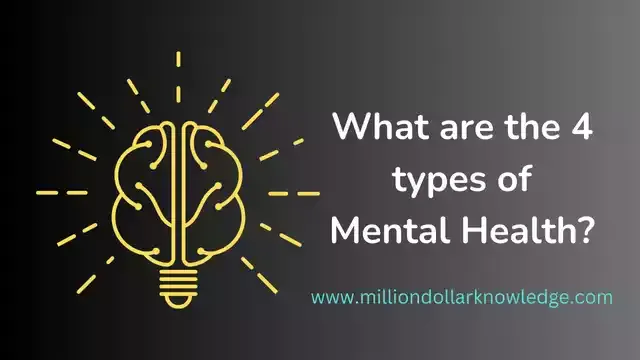What Are The 4 Types of Mental Health?
Mental health is a crucial aspect of overall well-being, yet it is often overlooked or misunderstood. There are 4 main types of mental health disorders that affect individuals in different ways. Understanding these categories is essential for recognizing and addressing mental health issues effectively.
Let's learn about 4 types of mental health disorders and how they can affect the lives of individuals and also find their treatment.
 |
| What are the 4 types of mental health? |
📘Table of Contents:
4 Types of mental health
Anxiety Disorders
These disorders involve excessive worry, fear, or anxiety that can interfere with daily functioning. For example, generalized anxiety disorder, panic disorders, and phobias.
Mood Disorders
It involve disturbances in a person's emotional state, leading to symptoms such as sadness, irritability, or mood swings. For example, depression and bipolar disorder.
Psychotic Disorders
It involve a loss of touch with reality, leading to symptoms such as hallucinations or delusions. For example, schizophrenia and delusional disorders.
Eating Disorders
It involve an unhealthy preoccupation with food, weight, and body image, leading to behaviors such as restricted eating or binge eating. For example, anorexia nervosa, bulimia nervosa, and binge eating disorder.
How do mental health disorders affect you?
Mental health disorders can affect individuals in various ways, such as impacting their relationships, work/school performance, and overall quality of life. Symptoms of mental health disorders can also lead to physical health issues if left untreated.
Treatment options for each type
Treatment options for mental health disorders vary depending on the type and severity of the condition. Common treatments include therapy (such as cognitive-behavioral therapy), medication (such as antidepressants or antipsychotics), lifestyle changes, and support groups. It is important for individuals to seek help from mental health professionals to receive an accurate diagnosis and appropriate treatment plan.
Conclusion
Mental health disorders can have a significant impact on individuals' lives, but with proper treatment and support, it is possible to manage symptoms and improve overall well-being. It is important to prioritize mental health and seek help if you or someone you know is struggling with a mental health issue.
READ MORE:
⇨ Plantago Major: The healing power of nature
⇨ How do you build a mindset like David Goggins?
⇨ Which part of your brain is involved in your motivation?
⇨ How to do mindfulness meditation for a more productive life?





